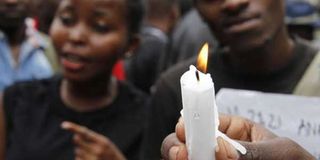Paris attack revives debate on Garissa University terror raid

Students from Technical University of Kenya hold a vigil after the April 2015 Garissa University College terrorist attack. Debate on the attack that left 147 people dead, most of them students, was recently revived following a similar attack in Paris, France, with concerns that the Garissa one was not accorded similar attention globally. FILE PHOTO | NATION MEDIA GROUP
What you need to know:
- A tweet by @JohnEMichel with the BBC News link to the story on the Garissa attack had 1,300 retweets.
- There were concerns that although the attacks were in many ways similar, the Paris one received more prominence.
- French ambassador to Kenya Remi Marechaux on Thursday said he would visit Moi University, where the former Garissa University College students are now studying, to give them aid.
News about the Garissa University College attack resurfaced online on Tuesday in the wake of the terror attack in Paris, France, that left at least 129 people dead.
On the BBC News website, for example, a story on the April 2015 Garissa attack, which left 147 people dead, most of them students, was the most read.
Also, a tweet by @JohnEMichel with the BBC News link to the story on the Garissa attack had 1,300 retweets.
The paradox that the Kenyan university attack that happened seven months ago would attract more online traffic than an attack that happened last Friday could probably have been fuelled by how the international community reacted to the Paris attack story.
There were concerns that although the attacks were in many ways similar, the Paris one received more prominence.
SIMILAR ATTACKS
As with the Garissa attack, the Paris attackers launched multiple attacks in crowded areas — bars, restaurants, a concert hall and a stadium — leaving 129 people dead.
In Kenya, heavily armed attackers stormed the Garissa University College, killing two security guards and then firing indiscriminately at students.
@MSRamanujam said: "I wonder why this wasn't covered by American media houses to the extent they covered #ParisAttacks.”
The controversy has been fuelled further by the Facebook application that allows users the option of changing their profile picture to one draped with the French flag.
One Twitter user, Alison MAcrina, tweeted: “147 people in Kenya were killed by Al-Shabaab. Did the world mourn and drape itself in the Kenyan flag?”
The tweet has since been retweeted 370 times and has 194 likes.
Responding to the concerns, Facebook CEO Mark Zuckerberg said: “Thank you to everyone who has reached out with questions and concerns about this.
“You are right that there are many other important conflicts in the world. We care about all people equally, and we will work hard to help people suffering in as many of these situations as we can.”
DELAYED CONDOLENCE MESSAGE
Kenyans were also unhappy with the fact that President Uhuru Kenyatta delayed in sending his condolences after the Garissa attack and failed to visit the victims.
@AyubAbdikadir said: "The top leadership failed to visit NEP even after Garissa University attack, the first lady's visit be cherished ever.”
Kenyan activist Boniface Mwangi tweeted: “Uhuru sent his condolences for #ParisAttacks hours after it happened. Took him days to acknowledge 147 killed in Kenya, Garissa terror attack.”
The tweet has been retweeted 250 times.
To show France's support for the Garissa attack victims, the French ambassador to Kenya Remi Marechaux on Thursday said he would visit Moi University, where the former Garissa University College students are now studying, to give them aid.
Each of the students will have his or her school fees covered for one year and will also receive a living allowance for day-to-day expenses.
“The handover of this contribution to the students of Garissa, which was a commitment by the French government, is a testimonial to solidarity between our two nations in their ordeal and in their common fight against terrorism,” reads the statement from the embassy.





